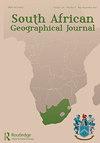加纳农业融资对技术采用、农业生产力和农村家庭经济福祉的影响:以Shai-Osudoku地区稻农为例
IF 1.4
4区 社会学
Q3 GEOGRAPHY
引用次数: 11
摘要
本研究采用焦点小组讨论、关键信息者访谈和定量家庭调查的方法,探讨加纳大阿克拉地区希亚-奥苏杜库地区小农获得信贷和贷款如何影响现代生产技术的采用,以及获得这些金融工具的限制。研究的具体目标是:(1)评估稻农在融资方面面临的挑战;(2)确定融资渠道是否影响现代水稻生产技术的采用;(3)确定对改进技术的贷款投资是否能提高农民的生产率和收入水平。该研究指出,金融机构对小农的不信任问题阻碍了他们获得贷款和信贷。银行和金融机构通过要求离谱的抵押品、担保人、高额储蓄资本、农业贷款的高利率、贷款延期和官僚程序等行为来传递他们的不信任。该研究表明,扶持性的政策环境和框架,加上仓库收据系统等支持性农村基础设施,可以显著增加农民获得信贷工具的机会,用于投资现代技术,以提高农业生产率,这对于解决加纳的粮食不安全和农村贫困问题至关重要。本文章由计算机程序翻译,如有差异,请以英文原文为准。
Impact of agricultural finance on technology adoption, agricultural productivity and rural household economic wellbeing in Ghana: a case study of rice farmers in Shai-Osudoku District
ABSTRACT This study uses focus group discussion, key informant interview, and quantitative household survey to explore how smallholders access credits and loans influence adoption of modern production technologies and what are perceived limitations to access these financial instruments in the Shia-Osuduku District in the Greater Accra Region of Ghana. The specific objectives of the study are; (1) to assess the challenges rice farmers face in accessing finance, (2) to determine if access to finance impacts the adoption of modern rice production technologies and (3) to determine whether loan investments in improved technologies increase productivity and income levels of farmers. The study noted that issues of mistrust for smallholder farmers by financial institutions act as barriers to facilitating their access to loans and credits. Banks and financial institutions relay their mistrust through actions such as requesting outrageous collateral, guarantors, a high sum of savings capital, and a high-interest rate for agriculture loans, delays, and bureaucratic processes in accessing loans. The study suggested that enabling policy environment and frameworks with a supportive rural infrastructure such as warehouse receipt systems can significantly increase farmers’ access to credit instruments for investment in modern technologies to increase agricultural productivity, which is essential to address issues of food insecurities and rural poverty in Ghana.
求助全文
通过发布文献求助,成功后即可免费获取论文全文。
去求助
来源期刊

South African Geographical Journal
GEOGRAPHY-
CiteScore
3.40
自引率
7.10%
发文量
25
期刊介绍:
The South African Geographical Journal was founded in 1917 and is the flagship journal of the Society of South African Geographers. The journal aims at using southern Africa as a region from, and through, which to communicate geographic knowledge and to engage with issues and themes relevant to the discipline. The journal is a forum for papers of a high academic quality and welcomes papers dealing with philosophical and methodological issues and topics of an international scope that are significant for the region and the African continent, including: Climate change Environmental studies Development Governance and policy Physical and urban Geography Human Geography Sustainability Tourism GIS and remote sensing
 求助内容:
求助内容: 应助结果提醒方式:
应助结果提醒方式:


